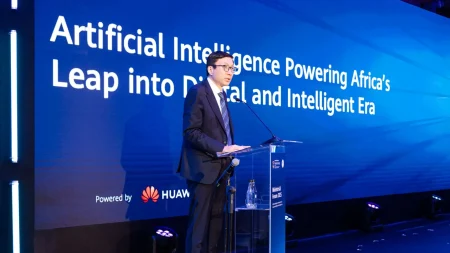Ghana’s not just dipping its toes into the digital future – it’s cannonballing right in.
At the launch of the National AI Strategy Stakeholder Consultation Forum, Minister for Communications, Digital Technology and Innovation, Hon. Samuel Nartey George, made it crystal clear: the age of artificial intelligence isn’t coming – it’s already here. And Ghana has no intention of being left behind.
“Data is the new fuel,” the Minister said, “but AI is what turns it into real value.” In other words: having data is nice; knowing what to do with it is a game-changer.
He laid out a big, bold vision for how AI can transform everything from agriculture and healthcare to logistics, smart cities and financial inclusion. But he wasn’t shy about the fine print either – ethical AI, data privacy, governance, and inclusion are top priorities. After all, what good is a tech revolution if it leaves people behind?
Under President John Dramani Mahama’s leadership, Ghana wants to become Africa’s AI hub – and this isn’t just a slogan. They’re putting their money where their digital mouth is. The Ministry itself got a glow-up (yes, they renamed it to highlight Digital Technology and Innovation), and they’re rolling out real programs to back it all up.
Exhibit A: the One Million Coders Program. Launched April 16, this national initiative aims to equip young Ghanaians with the skills needed to compete – and win – in the global digital economy. Think of it as a social contract for the AI age: train the talent, and let them build the future.
This isn’t just about coding bootcamps. It’s all tied into Ghana’s broader National AI Strategy, built around four core pillars:
1. Data as a National Asset
Ghana’s rich and varied datasets – yes, even genomic data – can fuel AI innovation across sectors. But with great data comes great responsibility. That’s why the Ministry is teaming up with the Data Protection Commission to develop an Open Data Framework, so every citizen benefits from their digital footprint – safely, ethically, and fairly.
2. Compute Power: Infrastructure That Thinks Big
AI doesn’t run on hope. It needs serious computing muscle. The plan? Scale up cloud capacity, optimize national data centers, and forge public-private partnerships to bridge infrastructure gaps. Bonus: regional cooperation is on the table too.
3. Talent Development: Ghana’s Digital Brainpower
The future belongs to coders, engineers, machine learning wizards, and AI-literate civil servants. The One Million Coders Program is just the beginning of building a workforce ready for a data-driven world.
4. Governance and Real-World Wins
Ghana’s AI ambitions aren’t staying theoretical. The strategy is loaded with practical, high-impact use cases – AI that helps predict crop health, deliver faster medical diagnoses, personalize learning in classrooms, and even boost national security through smarter surveillance. Governance will ensure all this innovation delivers measurable results for everyday Ghanaians.
The message from Minister George? Ghana isn’t just joining the AI race – it’s aiming to lead it, with purpose and pride. “Artificial Intelligence is no longer a future concept. It is here and it is already reshaping our world,” he said.
The government is inviting tech minds, investors, and visionaries to join in shaping Ghana’s AI-powered future. The Stakeholder Forum is just the starting point. What comes next? A smarter, fairer, more connected Ghana.






